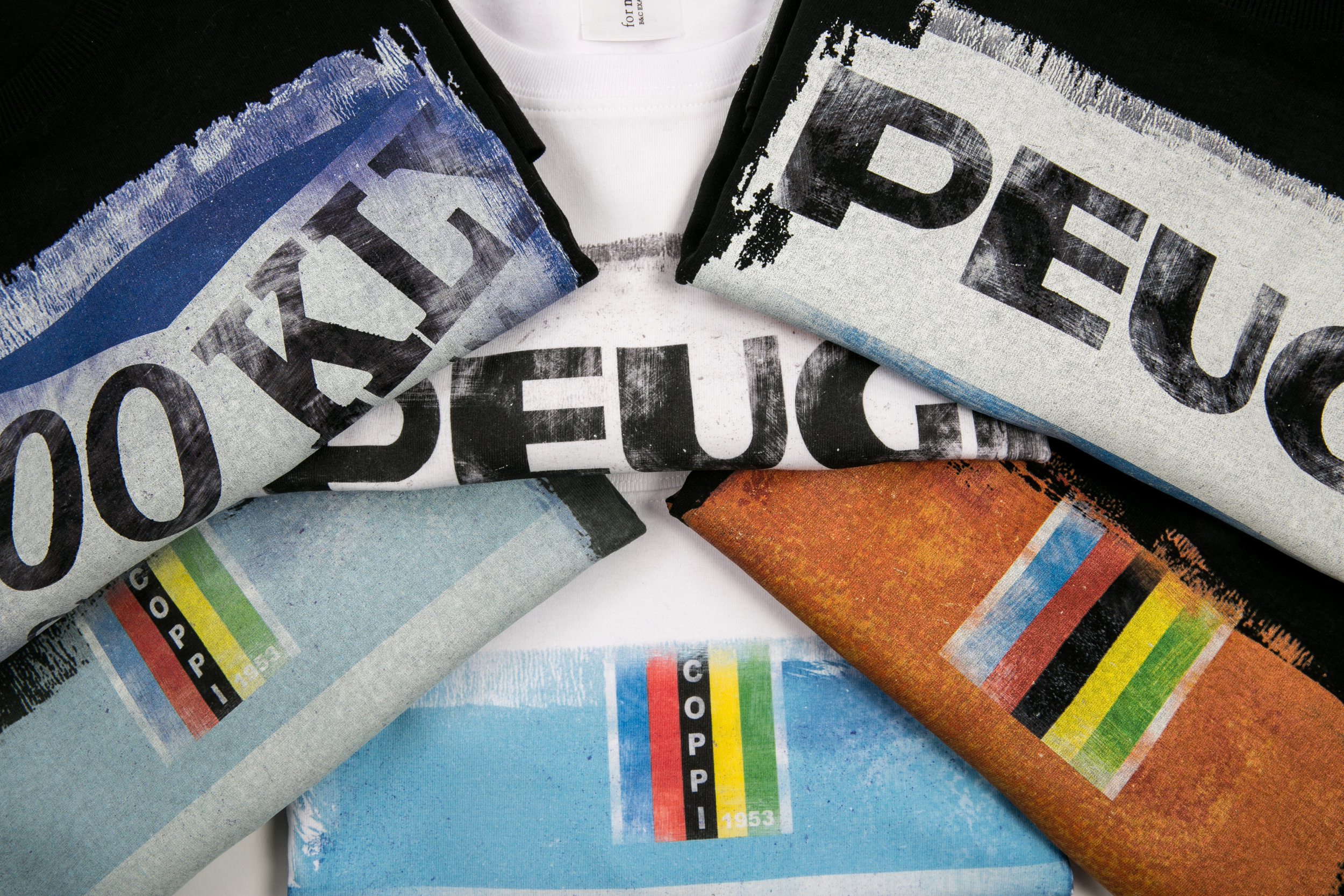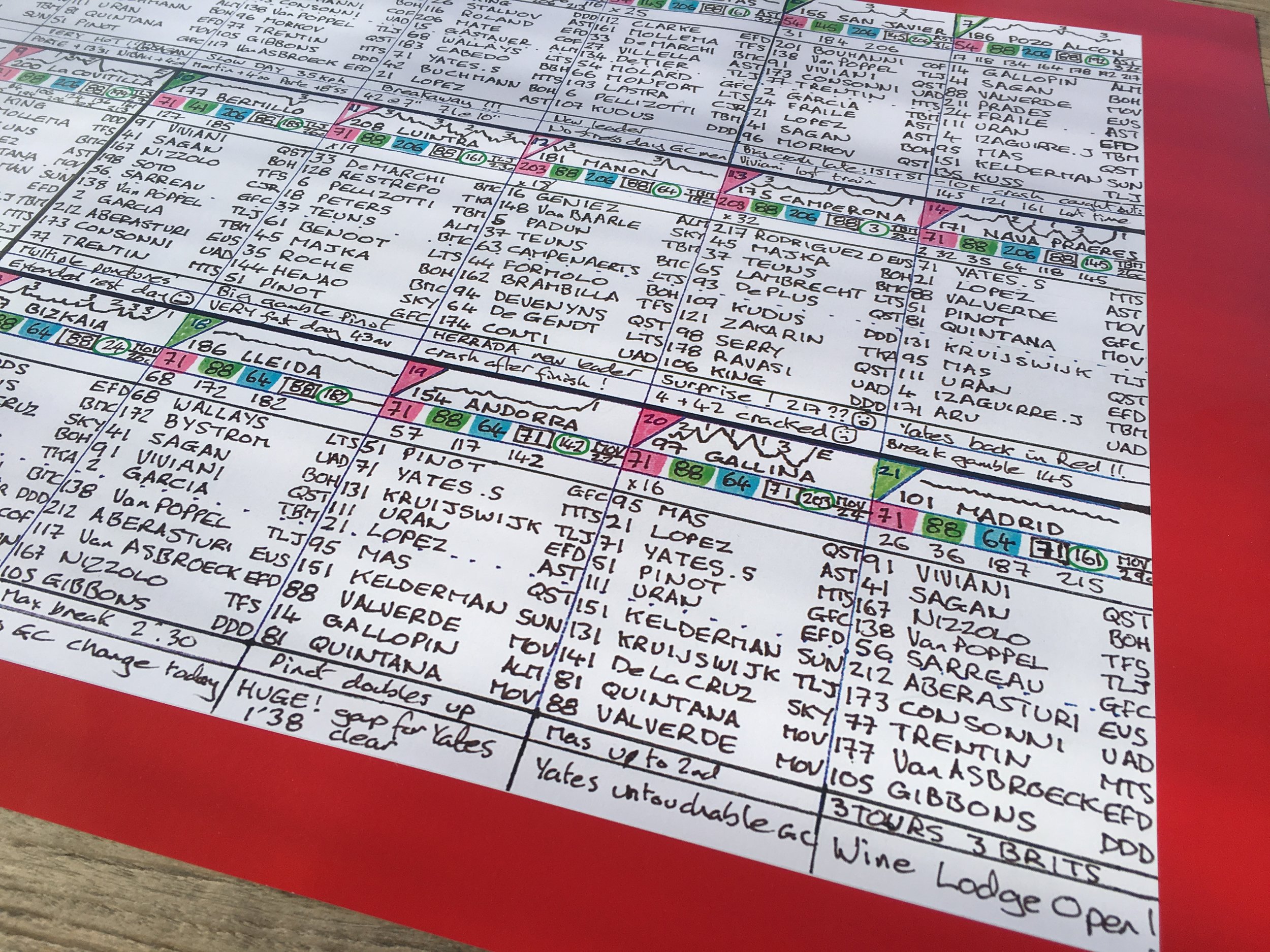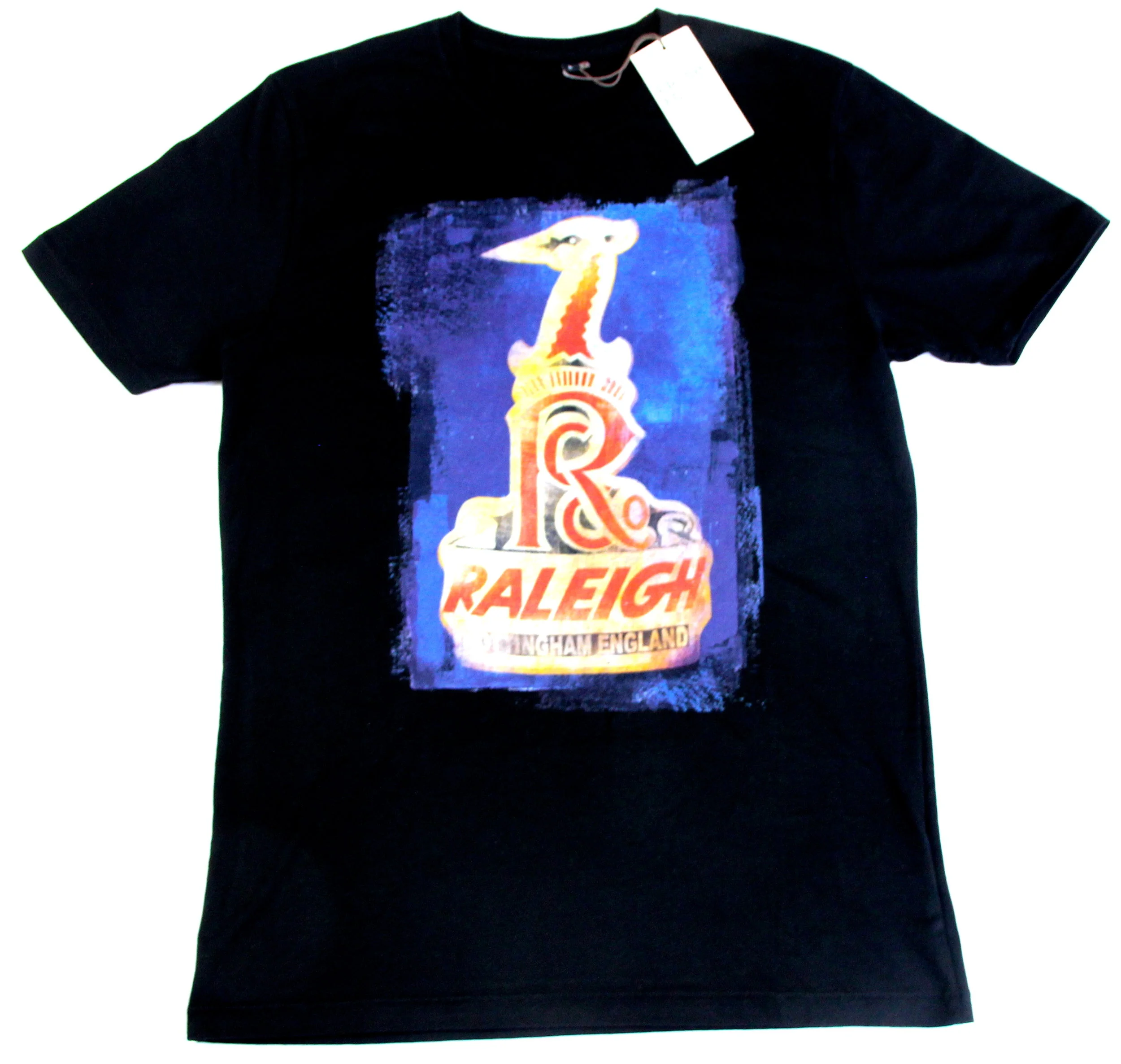By Robbie Broughton
Ian Cleverly: Rouleur's resident punk and Managing Editor
We were excited at the prospect of meeting Ian Cleverly. After all he’s the managing editor of what many regard as the best cycling magazine on the planet. Yes, excited and not just a little bit intrigued because, from what we understood, he doesn’t immediately fit the bill of a typical Rouleur reader: a punk who played in a 1980’s band called King Trigger; a self confessed technophobe who turns his nose up at Garmin computers and Strava data; a Cyclo Cross fanatic and lover of the aesthetics of steel framed bikes.
Rouleur started up in 2006 when founder, Guy Andrews, came up with the idea of a cycling magazine that offered a bit more than “fitness specials, pictures of bunch sprints and road tests of £1000 bikes.” The vision was to produce a beautiful magazine with serious writing in it for the discerning cyclist. It fitted in perfectly with Rapha’s philosophy at the time and Simon Mottram (Rapha’s CEO) put his backing behind it.
Rouleur was born with a front cover that bucked against the trend of its competitors: a huge black and white close up shot of some chain links. You can pick up an original copy for just over £200 on Ebay if you’re so inclined. Over the years these covers have become one of its defining features and it’s worth remembering that it was these that set a trend for a whole raft of imitators. The moody close up shot of Roubaix cobbles, the wooden planks of a velodrome, the close up of the polka dot: these have almost become clichés as dozens of publications copied a style and aesthetic that Rouleur instigated and developed.
The latest edition
The emphasis from the beginning has always been on quality: quality writers, quality photographs, even high end quality paper that it’s printed on. And at £10 per issue, you certainly pay for all that quality. So it’s not entirely surprising that this high end magazine has become the preferred reading for the high end earner. At last year’s Rouleur Classic in Central London, an ‘Emporium for Cycling’ that featured guests like Eddy Merckx, Fabian Cancellara and David Millar (and that was just on the first evening) tickets sold for £150. A quick glance at the clientele in their well-tailored city suits also revealed that they probably wouldn’t blink an eyelid at the cost either.
So, coming back to Ian Cleverly, punk and, it turns out, ex cycle courier, he doesn’t on the face of it seem to be a natural fit amid all the big bank balances, carbon frames and well heeled bike connoiseurs of Rouleur’s market. Isn’t he the antithesis of all that? And how did he end up at Rouleur?
“I worked in the courier industry for 20 years and had a mid life crisis at the age of 40 so I did a journalism course.” Cycling had always been an important part of his life- obviously his living as a cycle courier (“A crazy lifestyle, lovely people, everyone had an interesting story”) but as a child he had started racing from the age of 13. As he got into his late teens, other things became more interesting – punk, playing in a band and some short-lived success with the afore mentioned King Trigger. So after learning his new trade as a journalist, Cycling Weekly was an obvious place to go. He worked there for a couple of years before joining Rouleur.
Ian had got back into racing bikes again in his thirties: “Cyclo cross became my thing. I discovered it late but found that I was less rubbish at that than anything else. The best season I ever had was when I was a student on the journalism course because I had the time to train.”
In his Vicious Velo club kit (Photo by Joolz Dymond)
Ian likes nothing more than donning his punk inspired Vicious Velo kit (a club set up by fellow Rouleur man Andy Waterman) and getting dirty on a cyclo cross course at the weekend. In fact it was he who set up the Rapha Supercross in 2012.
At the time Cross was becoming marginalized and taking place in far flung places. Problems with health and safety and complaints from dog walkers meant that you had to go further and further out of London to take part. “I thought we needed to bring it back in, throw a few bells and whistles at it and Ally Pally was the perfect place to do it.” The ‘bells and whistles’ that Ian threw included a great course both at Broughton Hall and Alexandra Palace with obstacles like the ‘tequila shortcut’ and a foam fountain while being pelted with marshmallows. Beer and food tents, cow bells, lots of noise, DJs and race commentators helped to bring the party atmosphere together in an end of season treat.
Rapha Supercross (picture courtesy of Rapha)
Nowadays Ian says he doesn’t race as much as he used to – he loves to go off road on the South Downs but most of his cycling takes place on those well ridden lanes of North Kent: Layham’s Lane, Woldingham, Toys Hill. Every south London cyclist knows these places by heart. “When you start to even recognize bits of litter you know you really know them well!” Life in the saddle has improved for him since he got some sunglasses with prescription lenses which, along with a poor sense of direction that “leads you to new places" has resulted in the occasional detour. "But now I can actually see.” His favourite bike is his beloved Cielo made by Chris King in Portland USA, a steel frame that has absolutely no technology or computers on its handlebars.
“Yeah, I’m a technophobe. I’m shocking. I try not to be grouchy about it but there’s something about that I really don’t like. Anyway, I don’t need a computer to tell me how slowly I’m going.” His preference for steel over carbon comes down to the look and aesthetic. “I don’t consider myself to be vain or stylish but narrow steel tubes just look better. The fact it’s a bit heavier, so what?…I hate that chunky bottom bracket thing going on with carbon bikes. It just doesn’t look right.”
While Ian is a huge fan of the Velominati rules he’s not an avid follower of them. “What some people don’t realise is that it’s a joke! I’m pretty slack in lots of respects – I don’t shave my legs – I did once and my wife didn’t speak to me for two days.” And, as he said in a recent editorial, his Vicious Velo club kit is the preferred outfit for most rides. Frank Strack, author of Velominati, probably wouldn’t approve!
Ian’s straight talking and self deprecating humour comes through in his writing as well as in conversation. Read his piece on getting lost on the Alpine challenge in Annecy and how he regretted trying so hard on the first day when everyone was split into ability groups, or his misty eyed memories of his first bike, a Merckx that turned out not to be a Merckx at all.
While there’s still plenty of serious stuff in Rouleur, including some great angles on the history of bike racing, Ian is conscious of the fact that it was pretty dark in its early days. As other magazines have upped their game and used Rouleur as a bit of a blueprint for their own publications, he has to ensure that they keep evolving, make it more accessible and lighter in parts. Cartoonist Martin Procter brings a touch of humour mixed with the serious stuff. That lightness is reflected in Ian’s preference for books like Geraint Thomas’s recent biography, “an antidote to those misery memoirs of bike racers.”
The Ullrich article by the "Crazy Danes"
My own favourite pieces have been by the “Crazy Danes", Morten Okbo and Jakob Sorensen, "an extraordinary off-the-wall duo” whose disarming style has a way of getting interview subjects like Jan Ullrich to open up to them. “They just hang out and observe.” Ullrich trusted them to the extent that he told them things he would never have revealed to a conventional journalist with a voice recorder over a table. The pictures that go with the story (an unusually angled shot of Ullrich in toy armour, sword fighting with his son, or the picture of him staring out of the window) complement the writing brilliantly: slightly obscure, off kilter, but ultimately revealing.
These in depth profiles of riders have raised Rouleur far and away above its competitors: Cipollini, the La Vie Clair team, Kuiper, Armstrong, Sean Kelly. As Ian says, they try to make the magazine as timeless as possible so you can pick any issue from the last ten years off the shelf and it’s still relevant. While there’s so much history and heritage that has been told already, Rouleur has a knack of digging up stuff that has been missed by others or finding a new angle of a story that’s been done before.
I’m reminded of something Paul Smith said: that his work is informed by the classic design of the past but looks to the future, adding a modern twist. And Rouleur has this ability to do something similar in publishing terms. It doesn’t spend all its time lingering on the history in an overly nostalgic way. It embraces the here and now too. Ian knows the present crop of riders well, can tell from Mark Cavendish’s nervous jaw tick when not to ask a question, or what the peloton think of the tough parcours that the Grand Tours seem to be setting these days.
At the Rouleur Classic 2015 with David Millar and Eddy Merckx (photo by Jakob Kristian Sorensen)
While Ian claims, “I don’t have any heroes. I’m punk through and through,” it’s clear that there are certainly many people he admires in the cycling world of today like David Millar, for instance. “His insight on the TV commentary is extraordinary – he tells you what’s going to happen before it’s happened”. Roger Hammond who, “really gave it to me when I was at Cycling Weekly” turned out to be “a lovely guy, great company…I just caught him at the wrong time – that’s not how he is.” Meanwhile Adam Hansen, known and admired by all and sundry for his multiple Grand Tour completions gains Ian’s respect for the work he does for the riders’ Union.
“What consistently surprises me is how lovely they are and generally how fascinating they are. Cycling isn’t a sport you get into if you’re a complete arse. It’s full of humble, hard working people."
It’s been a fascinating hour so getting an insider’s view of the pro cycling world, as well as listening to Ian’s thoughts and his vision for Rouleur. To me, that final comment says a lot about him though. He’s someone with a great passion for the sport who thinks about the issues within in it on a profound level, but ultimately, he’s just a thoroughly decent bloke.




















































